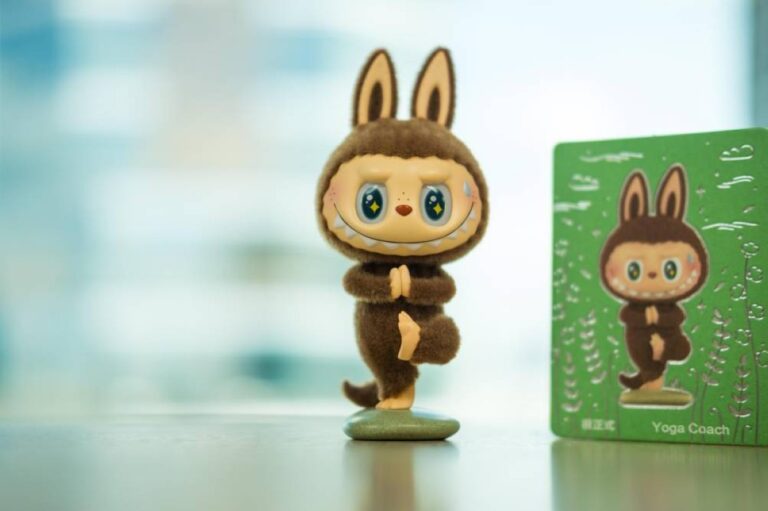When the sharp-toothed toy called Labubu started popping up on local feeds and storefronts, it didn’t take long for people in Kuwait to jump on the trend. Originally designed by artist Kasing Lung and sold through the Chinese collectible brand Pop Mart, Labubu is part of the broader “blind box” toy culture — where buyers unbox figures without knowing which character they’re getting.
Some love it. Others swear it’s cursed. But behind the creepy-cute character lies a growing conversation about trends, identity and what drives people to spend so much on a toy that, to some, looks almost possessed.
“I think it’s so ugly and scary. It looks like the dolls in horror movies,” said Rudina Ghanem, a medical intern, shivering at the thought. “It feels possessed. Like one day it’ll suddenly get up and flip the whole house upside down until everyone in the family dies — and then it’ll just sit there until new people come rent the house.”
That unsettling vibe hasn’t stopped the toy’s popularity in Kuwait. According to a local Labubu reseller, Shaikha Om Nasser Al-Nouri, most of her customers are teenagers between 15 and 18 years old. “They seem obsessed with it,” she said. “They don’t mind spending all their pocket money just to own one. I get 8 or 9 orders a day, and one person might order three, four — even a whole box.”
According to her, a single medium-sized Labubu starts at KD 20, but limited editions go for far more. She sells a box of six Labubus for around KD 150. Larger plush versions and rare designs can be even more expensive — and, inevitably, fakes have flooded TikTok and Instagram for as little as KD 2. Shaikha said it costs her about KD 15 to import a single Labubu from the US.
Twenty-two-year-old Durnaz Dashti, a half-Kuwaiti, half-Chinese Labubu reseller and fan, said she first heard of the toy in 2019 but didn’t buy one until this May. “That was me being nosy. I kept seeing it all over my feed. I had to know what the hype was about,” she admitted. “Also, I just love consuming and spending money.”
When she finally unboxed her Labubu, the appeal became clear: “I know it sounds silly, but it’s the process of opening it. The way Pop Mart packages the boxes is super satisfying. And when you finally see which one you got, it’s like your little baby. It’s fluffy and small — it makes you feel something.”
She doesn’t consider Labubu a waste of money and plans to keep hers even after the trend fades. Dashti defended the high prices: “It’s expensive to import, especially when buying from resellers like StockX — they already mark up the price.” The cheapest version she sells is a small keychain Labubu for KD 12.
Not everyone was impressed after the unboxing. Wurood Al-Shatti, another curious buyer, said she wanted to form her own opinion by trying the toy herself rather than judge it online. “I enjoy toys sometimes, and my mentor reminded me to live my age and be silly with my choices,” she said. “But after evaluating it… I think it’s a little boring carrying something around that everyone owns.” She did find one redeeming feature: “I like looking at it from the back — it looks cute. But the face is terrible. Nobody should deny that.”
The rise of Labubu didn’t go unnoticed by Lulwa Al-Jassim, an English professor at Kuwait University and a self-described marketing enthusiast. She believes the trend is a textbook case of herd mentality: A marketing term that refers to people blindly following what others do, often without thinking critically. “It’s blind imitation,” she said. “Celebrities or influencers use it, people around us have it — and we feel left out if we don’t.”
She added: “Most people don’t even like the toy or actually want it. Its shape is weird and unsettling — the eyes are too big, the teeth stick out — it’s not appealing at all. But maybe it’s just a way to feel like we belong.” Still, Al-Jassim thinks its oddness might help explain its appeal. “People are tired of perfection. Barbie, for example, is too pretty, too ideal. Everything around us is filtered and perfect. Labubu is the opposite — imperfect, strange, and unfamiliar.”
Freshly graduated Lolwah Salem, another skeptic, said the toy triggers something deeper than just personal taste. “I saw a picture of an ancient demon that looks just like it,” she said. “No matter how non-superstitious I am, Labubu just doesn’t sit right with me.” She added: “It’s borderline sinister. I’m already naturally skeptical of anything that rises to fame this fast — especially something that’s been around forever like bag charms and keychains. What makes these little devils special?” To her, Labubu represents consumer culture at its loudest: “These are a prime example of capitalistic consumerism and I HATE it. Like, one: why are they so expensive? Two: they’re so ugly!”
For others, like 24-year-old Noor Akar, the whole thing is beyond ridiculous. “Labubu is the most stupid trend of 2025,” she said flatly. “People blindly follow trends and get influenced way too easily. I think it’s sinful to spend this much on something so pointless — people will forget about it next month and throw it away.”


